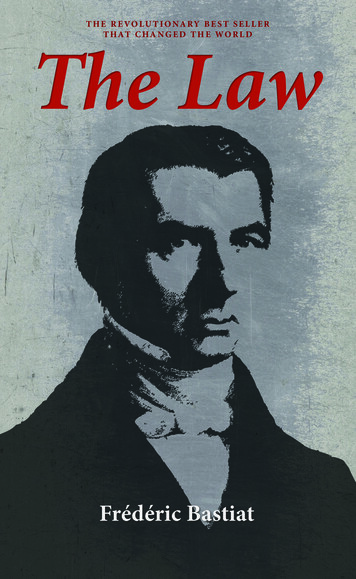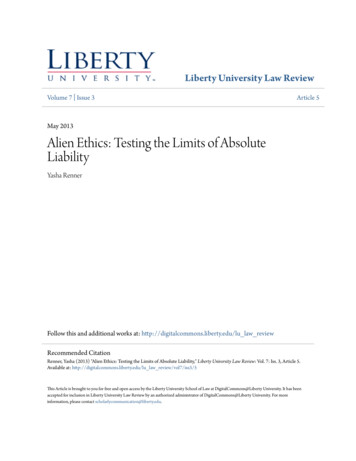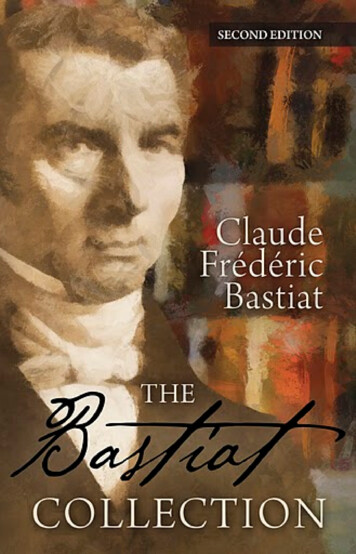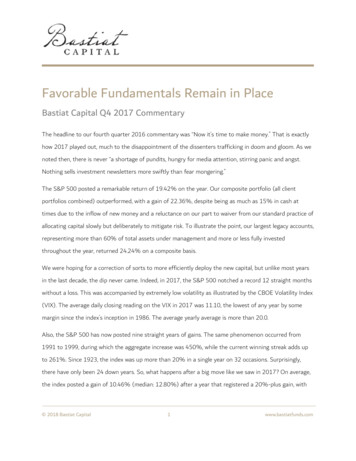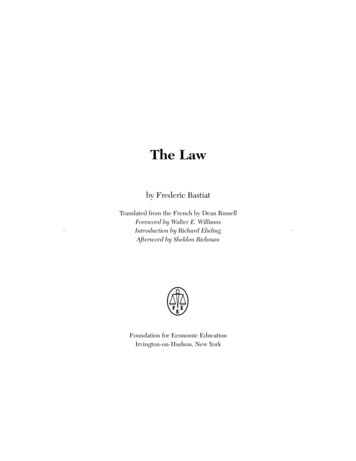
Transcription
pfront-04.qxd6/8/20042:17 PMPage iThe Lawby Frederic BastiatTranslated from the French by Dean RussellForeword by Walter E. WilliamsIntroduction by Richard EbelingAfterword by Sheldon RichmanFoundation for Economic EducationIrvington-on-Hudson, New York
pfront-04.qxd6/8/20042:17 PMPage iiThe LawCopyright 1998 by the Foundation for Economic EducationAll rights reserved. No part of this book may be reproduced or transmitted inany form or by any means, electronic or mechanical, including photocopying,recording or by any information storage and retrieval system without permission in writing from the publisher, except by a reviewer, who may quote briefpassages in a review.Foundation for Economic Education30 South BroadwayIrvington-on-Hudson, NY 10533(914) 591-7230Publisher’s Cataloging in Publication(Prepared by Quality Books, Inc.)Bastiat, Frederic, 1801-1850[Loi. English]The law / Frederic Bastiat. — 2nd ed.p. cm.Includes indexPreassigned LCCN: 98-73568ISBN 1-57246-073-31. Law and socialism. 2. Law—Philosophy.Socialism and liberty. I. Title.K357.B37 19983.340.115QBI98-1118Second edition, August 1998second printing, September 2000; third printing, October 2001fourth printing, June 2004Cover design by Doug HesseltineManufactured in the United States of America
pfront-04.qxd6/8/20042:17 PMPage iiiForewordWalter E. WilliamsI must have been forty years old before reading FredericBastiat’s classic The Law. An anonymous person, to whom I shalleternally be in debt, mailed me an unsolicited copy. After reading the book I was convinced that a liberal-arts education without an encounter with Bastiat is incomplete. Reading Bastiatmade me keenly aware of all the time wasted, along with thefrustrations of going down one blind alley after another, organizing my philosophy of life. The Law did not produce a philosophical conversion for me as much as it created order in my thinkingabout liberty and just human conduct.Many philosophers have made important contributions tothe discourse on liberty, Bastiat among them. But Bastiat’s greatest contribution is that he took the discourse out of the ivorytower and made ideas on liberty so clear that even the unlettered can understand them and statists cannot obfuscate them.Clarity is crucial to persuading our fellowman of the moral superiority of personal liberty.Walter E. Williams is the John M. Olin Distinguished Professor of Economics at George Mason University, Fairfax, Virginia.iii
pfront-04.qxd6/8/20042:17 PMPage ivLike others, Bastiat recognized that the greatest singlethreat to liberty is government. Notice the clarity he employs tohelp us identify and understand evil government acts such aslegalized plunder. Bastiat says, “See if the law takes from somepersons what belongs to them, and gives it to other persons towhom it does not belong. See if the law benefits one citizen atthe expense of another by doing what the citizen himself cannotdo without committing a crime.” With such an accurate description of legalized plunder, we cannot deny the conclusion thatmost government activities, including ours, are legalized plunder, or for the sake of modernity, legalized theft.Frederic Bastiat could have easily been a fellow traveler ofthe signers of our Declaration of Independence. The signers’vision of liberty and the proper role of government was capturedin the immortal words “We hold these truths to be self-evident,that all men are created equal, that they are endowed by theirCreator with certain Unalienable Rights, that among these areLife, Liberty and the pursuit of Happiness. That to secure theserights, governments are instituted among Men. . . .” Bastiatechoes the identical vision, saying, “Life, faculties, production—in other words individuality, liberty, property— that is man. Andin spite of the cunning of artful political leaders, these three giftsfrom God precede all human legislation, and are superior to it.”Bastiat gave the same rationale for government as did ourFounders, saying, “Life, liberty and property do not existbecause men have made laws. On the contrary, it is the fact thatlife, liberty and property existed beforehand that caused men tomake laws in the first place.” No finer statements of natural oriv
pfront-04.qxd6/8/20042:17 PMPage vGod-given rights have been made than those found in our Declaration of Independence and The Law.Bastiat pinned his hopes for liberty on the United Statessaying, “ . . . look at the United States. There is no country in theworld where the law is kept more within its proper domain: theprotection of every person’s liberty and property. As a consequence of this, there appears to be no country in the worldwhere the social order rests on a firmer foundation.” Writing in1850, Bastiat noted two areas where the United States fell short:“Slavery is a violation, by law, of liberty. The protective tariff is aviolation, by law, of property.”If Bastiat were alive today, he would be disappointed withour failure to keep the law within its proper domain. Over thecourse of a century and a half, we have created more than 50,000laws. Most of them permit the state to initiate violence againstthose who have not initiated violence against others. These lawsrange from anti-smoking laws for private establishments andSocial Security “contributions” to licensure laws and minimumwage laws. In each case, the person who resolutely demands anddefends his God-given right to be left alone can ultimately sufferdeath at the hands of our government.*Bastiat explains the call for laws that restrict peaceable, voluntary exchange and punish the desire to be left alone by sayingthat socialists want to play God. Socialists look upon people asraw material to be formed into social combinations. To them—*Death is not the stated penalty for disobedience; however, death canoccur if the person refuses to submit to government sanctions for his disobedience.v
pfront-04.qxd6/8/20042:17 PMPage vithe elite—“the relationship between persons and the legislatorappears to be the same as the relationship between the clay andthe potter.” And for people who have this vision, Bastiat displaysthe only anger I find in The Law when he lashes out at do-gooders and would-be rulers of mankind, “Ah, you miserable creatures! You who think that you are so great! You who judgehumanity to be so small! You who wish to reform everything!Why don’t you reform yourselves? That task would be sufficientenough.”Bastiat was an optimist who thought that eloquent arguments in defense of liberty might save the day; but history is noton his side. Mankind’s history is one of systematic, arbitraryabuse and control by the elite acting privately, through thechurch, but mostly through government. It is a tragic historywhere hundreds of millions of unfortunate souls have beenslaughtered, mostly by their own government. A historian writing 200 or 300 years from now might view the liberties thatexisted for a tiny portion of mankind’s population, mostly in theWestern world, for only a tiny portion of its history, the last century or two, as a historical curiosity that defies explanation. Thathistorian might also observe that the curiosity was only a temporary phenomenon and mankind reverted back to the traditionalstate of affairs—arbitrary control and abuse.Hopefully, history will prove that pessimistic assessmentfalse. The worldwide collapse of the respectability of the ideas ofsocialism and communism suggests that there is a glimmer ofhope. Another hopeful sign is the technological innovations thatmake it more difficult for government to gain information on itsvi
pfront-04.qxd6/8/20042:17 PMPage viicitizens and control them. Innovations such as informationaccess, communication, and electronic monetary transactionswill make government attempts at control more costly and lessprobable. These technological innovations will increasinglymake it possible for world citizens to communicate andexchange with one another without government knowledge,sanction, or permission.Collapse of communism and technological innovations,accompanied by robust free-market organizations promotingBastiat’s ideas, are the most optimistic things I can say about thefuture of liberty in the United States. Americans share an awesome burden and moral responsibility. If liberty dies in theUnited States, it is destined to die everywhere. A greater familiarity with Bastiat’s clear ideas about liberty would be an important step in rekindling respect and love, and allowing the resuscitation of the spirit of liberty among our fellow Americans.vii
pfront-04.qxd6/8/20042:17 PMPage viii
pfront-04.qxd6/8/20042:17 PMPage ixIntroductionRichard EbelingThe defense of economic liberty has never been an easytask. Adam Smith expressed his own despair at this problem inThe Wealth of Nations. After presenting his powerful criticismsof mercantilism—the eighteenth-century system of governmentregulation and planning—he despondently suggested that freetrade in Great Britain was as unlikely as the establishment of autopia.He said that two factors made the success of economic liberty unpromising. “Not only the prejudices of the public,” Smithsaid, “but what is much more unconquerable, the private interests of many individuals, irresistibly oppose it.”1 By the prejudices of the public, Smith meant the apparent difficulty of manyordinary people to follow the often abstract and complex arguments of the economic theorist that demonstrate the superiorworkings of the free market over various forms of governmentintervention and control. And by the private interests of manyindividuals, Smith had in mind the wide variety of specialinterest groups that gain from, and would therefore alwayslobby hard to maintain, government regulations that limit orprevent open competition. In combination, Smith feared, theseRichard Ebeling is president of the Foundation for Economic Education.ix
pfront-04.qxd6/8/20042:17 PMPage xtwo factors would permanently prevent the logic of economicfreedom from ever winning in the arenas of ideas and politics.In the nineteenth century, however, there was one champion of freedom who mastered the art of making the complexitiesof economic reasoning understandable to the layman: theFrench classical-liberal economist Frederic Bastiat(1801–1850). More than one historian of economic thought hasemphasized Bastiat’s special abilities in undermining the rationales for protectionism, socialism, and interventionism.Sir Alexander Gray, for example, said that, “No one hasever been quite so skillful in making the case of his antagonistlook extremely foolish. Even now his most ephemeral workremains a joy to read, by reason of its wit, its merciless satire andthe neatness wherewith he pinks his opponents.” 2 Lewis Haneyreferred to Bastiat’s “pleasing and luminous style” and how,“brilliantly, with fable and irony, the masses are appealed to.”3Eduard Heimann, a critic of the market economy,described him as, “A brilliant writer, [who] achieved world famewith his parable of the candle-makers, who petition for protection against the unfair competition of the sun in order that thecommunity may become richer by the enrichment of theirindustry.”4 Charles Gide and Charles Rist pointed out that “Ifmodern Protectionists no longer speak of the ‘inundation of acountry’ or of an ‘invasion of foreign goods’ . . . we too often forget that all this is due to the small but admirable pamphlets written by Bastiat . . . . No one could more scornfully show thelaughable inconsistency of tunneling the mountains whichdivide countries, with a view to facilitating exchange, while atx
pfront-04.qxd6/8/20042:17 PMPage xithe same time setting up a customs barrier at each end.”5 Andeven though Bastiat’s pen was sharp against the protectionistand collectivist ideas of his time, William Scott emphasized thatthe French liberal’s “attitude was calm and dignified and in spiteof the incisiveness of his criticism he showed appreciation of themotives of his adversaries. He gave them full credit for a desireto promote the well-being of society, but wished simply to showthat they were on the wrong path and, if possible, to set themright.”6Those qualities led Joseph A. Schumpeter to call Bastiat“the most brilliant economic journalist who ever lived.”7 AndLudwig von Mises praised him as a “brilliant stylist, so that thereading of his writings affords a quite genuine pleasure. . . .[H]is critique of all protectionist and related tendencies is eventoday unsurpassed. The protectionists and interventionists havenot been able to advance a single word in pertinent and objective rejoinder.”8Other authors have modeled some of their own works afterhim. At the beginning of the twentieth century, the French freemarket economist Yves Guyot said that his own little book,Economic Prejudices, was offered in the footsteps of FredericBastiat, with the purpose of “[setting] forth truths in a handy,convenient form that is easy to remember, to criticize errors bymeans of proof that any one can apply,” as Bastiat had done halfa century earlier.9 And surely the most famous and influentialadaptation of Bastiat’s method and approach in the twentiethcentury was Henry Hazlitt’s Economics in One Lesson, in whichthe author said, “The present work may, in fact, be regarded asxi
pfront-04.qxd6/8/20042:17 PMPage xiia modernization, extension and generalization of the approachfound in Bastiat’s pamphlet,” known by the title “What Is Seenand What Is Not Seen.”10* * *Claude Frederic Bastiat was born on June 30, 1801, inBayonne, France, the son of a prominent merchant.11 His mother died when he was seven years old, and his father passed awaytwo years later, when Frederic was only nine. He was broughtup by an aunt, who also saw to it that he went to the College ofSorèze beginning when he was 14. But at 17 he left without finishing the requirements for his degree and entered his uncle’scommercial firm in Bayonne. Shortly afterward he came acrossthe writings of the French classical-liberal economist JeanBaptiste Say, and they transformed his life and thinking.12 Hebegan a serious study of political economy and soon discoveredthe works of many of the other classical-liberal writers in Franceand Great Britain.In 1825 he inherited a modest estate in Mugron from hisgrandfather and remained there until 1846, when he moved toParis. During these 20 years Bastiat devoted almost all his timeto absorbing a vast amount of literature on a wide variety of subjects, sharing books and ideas with his friend Félix Coudroy. Itseems that Coudroy had socialist leanings, and Bastiat began torefine his skills in clear thinking and writing by formulating thearguments that finally won over his friend to a philosophy offreedom.xii
pfront-04.qxd6/8/20042:17 PMPage xiiiIn the late 1820s and 1830s he began writing monographsand essays on a variety of economic topics. But his real reputationas a writer began in 1844, when he published a lengthy article indefense of free trade and then a monograph on Cobden and theLeague: The English Movement for Free Trade. While writingthese works Bastiat began a correspondence with RichardCobden, one of the primary leaders of the British Anti-Corn LawLeague, the association working for the repeal of all barriers tofree trade. The two proponents of economic freedom became fastfriends, supporting each other in the cause of liberty.The success of these writings, and the inspiration from thesuccess of Cobden’s free-trade activities in bringing about theend of agricultural protectionism in Great Britain in 1846, resulted in Bastiat’s moving to Paris to establish a French free-tradeassociation and to start Le Libre Échange, a newspaper devotedto this cause.13 For two years Bastiat labored to organize and propagandize for free trade. At first he was able to attract a variety ofpeople in commerce and industry to support his activities, including delivering speeches, designing legislation for the repeal ofFrench protectionism, and preparing writings to change publicopinion. But it was to no avail. There were too many special interests benefiting from privileges and favors given by the government, and he was unable to arouse a sustained interest in hiscause among the general public. It appeared that Adam Smithhad been right in lamenting the prejudices of the public and thepower of the interests, at least in France.Following the revolution of February 1848, Bastiat began acareer in politics, serving first in the French Constituentxiii
pfront-04.qxd6/8/20042:17 PMPage xivAssembly and then in the Legislative Assembly. Having devotedmost of his previous writings to demonstrating the fallacies inthe arguments for protectionism, Bastiat turned his attention toa new enemy of economic liberty: socialism. In the LegislativeAssembly he delivered powerful speeches against public-worksprograms, guaranteed national-employment schemes, wealthredistribution proposals, nationalization of industry, and rationales for the expansion of bureaucratic controls over social andeconomic life. But because of a worsening tuberculosis thatweakened his voice, he turned to the written word, producing alarge number of essays detailing the absurdities in the arguments of the socialists.Bastiat made his last appearance in the Assembly inFebruary 1850. By spring of that year his health had declined sodramatically that he was forced to step down from his legislativeresponsibilities and spend the summer in the Pyrénées mountains in the south of France. He returned to Paris in Septemberand visited his friends in the cause for free trade, before settingout for Italy in search of a cure for his tuberculosis. He died inRome on December 24, 1850, at the age of 49.Frederic Bastiat’s intellectual legacy in the fight for economic freedom is contained in three volumes. Two of them arecollections of some of his most biting, witty, and insightful essaysand articles, and are available in English under the titlesEconomic Sophisms14 and Selected Essays on PoliticalEconomy.15 In his last years, Bastiat devoted part of his time toa general work of social philosophy and economic principles,published under the name Economic Harmonies.16xiv
pfront-04.qxd6/8/20042:17 PMPage xvAs Henry Hazlitt rightly emphasized, the central idea inmuch of Bastiat’s writings is captured in his essay “What Is Seenand What Is Not Seen,” which was the last piece he wrotebefore his death in 1850.17 He points out that the short-runeffects of any action or policy can often be quite different fromits longer-run consequences, and that these more remote consequences in fact may be the opposite from what one had hopedfor or originally planned.Bastiat was able to apply the principle of the seen and theunseen to taxes and government jobs. When government taxes,what is seen are the workers employed and the results of theirlabor: a road, a bridge, or a canal. What is unseen are all theother things that would have been produced if the tax moneyhad not been taken from individuals in the private sector and ifthe resources and labor employed by the government had beenfree to serve the desires of those private citizens. Government,Bastiat explained, produces nothing independent from theresources and labor it diverts from private uses.This simple but profoundly important insight is the theoretical weapon through which Bastiat is able to demonstrate theerrors and contradictions in the ideas of both protectionists andsocialists. Thus in such essays as “Abundance and Scarcity,”“Obstacle and Cause,” and “Effort and Result,” he shows that barriers and prohibitions to freedom of trade only lead to poverty.18He points out that each of us is both a consumer and a producer. To consume a good we must either make it ourselves ormake some other good that we think someone else will take inexchange for the good we want. As consumers we desire asxv
pfront-04.qxd6/8/20042:17 PMPage xvimany goods as possible at the lowest possible prices. In otherwords, we want abundance. But as producers we want a scarcity of the goods we bring to market. In open competition, inwhich all exchanges are voluntary, the only way to “capture” customers and earn the income that enables each of us, in turn, tobe a consumer is to offer better, cheaper, and more goods thanour competitors. The alternative to this method, Bastiat warns,is for each of us as a producer to turn to the government to gainfrom our neighbors what we are unable to obtain throughpeaceful, nonviolent trade on the market.Herein lies Bastiat’s famous distinction between illegal andlegal plunder, which is at the center of his analysis in The Law.19The purpose of government, he says, is precisely to secure individuals in their rights to life, liberty, and property. Without suchsecurity men are reduced to a primitive life of fear and selfdefense, with every neighbor a potential enemy ready to plunder what another has produced. If a government is strictly limited to protecting men’s rights, then peace prevails, and men cango about working to improve their lives, associating with theirneighbors in a division of labor and exchange.But government can also be turned against those whom itis meant to protect in their property. There can arise legal plunder, in which the powers of government are used by variousindividuals and groups to prevent rivals from competing, torestrict the domestic and foreign trading opportunities of otherconsumers in the society, and therefore to steal the wealth ofone’s neighbors. This, Bastiat argues, is the origin and basis ofprotectionism, regulation, and redistributive taxation.xvi
pfront-04.qxd6/8/20042:17 PMPage xviiBut the consequences of legal plunder are not only thepolitical legitimizing of theft and the breakdown of moralitythrough the blurring of the distinction between right andwrong—however crucially important and dangerous these maybe for the long-term stability and well-being of society. Suchpolicies also, by necessity, reduce the prosperity of the society.Every trade protection, every domestic regulatory restriction, every redistributive act of taxation above that minimalamount necessary to secure the equal protection of each individual’s rights, Bastiat insisted, reduces production and competition in society. Scarcity replaces abundance. Limiting competition reduces the supply of goods available to all members ofthe society. Imposing protectionist barriers on foreign trade ordomestic regulations on production decreases the general availability of goods and makes them more expensive. Everyone is,in the end, made worse off. And thus Bastiat reached his famousconclusion that the state is the great fiction through whicheveryone tries to live at the expense of everyone else.Why does legal plunder come about? Bastiat saw its originin two sources. First, as we have just seen, some people see it asan easier means of acquiring wealth than through work and production. They use political power to redistribute from otherswhat they are unwilling or unable to obtain from their neighborsthrough the voluntary exchanges of the marketplace. One basisfor legal plunder, in other words, is the misguided spirit of theft.The second, and far more dangerous, source of legal plunder is the arrogant mentality of the social engineer. Through theages, Bastiat showed, social and political philosophers havexvii
pfront-04.qxd6/8/20042:17 PMPage xviiiviewed the multitude of humanity as passive matter, similar toclay, waiting to be molded and shaped, arranged and movedabout according to the design of an intellectually superior elite.With a timeless relevance, Bastiat points out that the political elite praises the ideal of democracy, under which “the people” select those who will hold political office. But once theelectoral process is finished, those elected to high political officearrogate to themselves the planning, directing, and controllingof every aspect of social and economic life. The task of moderndemocracy, apparently, is to periodically appoint those who shallbe our societal dictators.Is this the way men have to live? Was illegal and legal plunder the only form of social existence? Bastiat answered no. InEconomic Harmonies he tried to explain the nature and logic ofa system of peaceful human association through production andtrade. Historians of economic thought and other critics ofBastiat have said this work demonstrates that, despite his brilliant journalistic talents, he failed as a serious economic theorist.They point to his use of a form of a labor theory of value or hisfaulty theory of savings, capital, and interest.20But beyond these errors and limitations is an aspect ofEconomic Harmonies that still makes it insightful. Harmoniesattempts to offer a grand vision of the causal relationshipsamong work, the division of labor, voluntary exchange, andmutual improvement of men’s condition, as well as the importance of private property, individual freedom, and domestic andforeign free trade. In freedom there is social harmony, sinceeach man sees his neighbor not as an enemy but as a partner inxviii
pfront-04.qxd6/8/20042:17 PMPage xixthe ongoing processes of human improvement. Where relationships are based on consent and mutual agreement there can beno plunder, only reinforcing prosperity, as each works to tradewith his neighbors and acquire all the things that make life better for each and all.If one looks at the period during which Bastiat devoted hisefforts to fight for freedom and free trade, the conclusion wouldappear to be that his life ended in failure. Both during his lifetime and following his death France remained in the grip of theprotectionist and interventionist spirit, never achieving thedegree of economic liberty enjoyed in Great Britain through thesecond half of the nineteenth century.And yet Bastiat’s life should be seen as a glorious success.For the 150 years since his passing, each new generation ofadvocates of economic liberty has been inspired by his writings.His fables and essays read as fresh as if they were written yesterday, because they address the underlying nature of humanassociation and the dangers from political encroachment on thesocial and market orders.1. Adam Smith, An Inquiry into the Nature and Causes of the Wealth ofNations, Book Four, chapter two (New York: Modern Library, 1937 [1776]),pp. 437–38.2. Sir Alexander Gray, The Development of Economic Doctrine: AnIntroductory Survey (London: Longmans, Green, 1931), pp. 244–45.3. Lewis H. Haney, History of Economic Thought (New York:Macmillan, 1936), pp. 331–32.4. Eduard Heimann, History of Economic Doctrines: An Introduction toEconomic Theory (London: Oxford University Press, 1945), p. 124.xix
pfront-04.qxd6/8/20042:17 PMPage xx5. Charles Gide and Charles Rist, A History of Economic Doctrines,From the Time of the Physiocrats to the Present Day (Boston: D.C. Heath,1915), pp. 329–30.6. William A. Scott, The Development of Economics (New York: TheCentury Co., 1933), p. 244.7. Joseph A. Schumpeter, History of Economic Analysis (New York:Oxford University Press, 1954), p. 500.8. Ludwig von Mises, Liberalism: The Classical Tradition (Irvington-onHudson, N.Y.: Foundation for Economic Education, 1996 [1927]), p. 197.9. Yves Guyot, Economic Prejudices (London: Swan Sonnenschein,1910), p. v.10. Henry Hazlitt, Economics in One Lesson (New York: Harper &Brothers, 1946).11. The following brief summary of Bastiat’s life and professional activities is drawn primarily from Dean Russell, Frédéric Bastiat: Ideas andInfluence (Irvington-on-Hudson, N.Y.: Foundation for Economic Education,1965); also Dean Russell, Frédéric Bastiat and the Free Trade Movement inFrance and England, 1840–1850 (Geneva: Imprimarie Albert Kundig, 1959);and George C. Roche, Frederic Bastiat: A Man Alone (Hillsdale, Mich.:Hillsdale College Press, 1977).12. Jean-Baptiste Say, A Treatise on Political Economy, or theProduction, Distribution and Consumption of Wealth [1921] (N.Y.: AugustusM. Kelley, 1971); Say, Letters to Mr. Malthus on Several Subjects of PoliticalEconomy [1821] (N.Y.: Augustus M. Kelley, 1967); and R. R. Palmer, ed., J.-B.Say: An Economist in Troubled Times (Princeton, N.J.: Princeton UniversityPress, 1997).13. For a brief account of the free-trade movement in Great Britain andits triumph in the middle of the nineteenth century, see Richard M. Ebeling,Austrian Economics and the Political Economy of Freedom (Northampton,Mass.: Edward Elgar, 2005), ch. 10: “The Global Economy and ClassicalLiberalism: Past, Present and Future,” pp. 247–281, and especially pp.248–252.14. Economic Sophisms, trans. and ed. Arthur Goddard, with introduction by Henry Hazlitt (Irvington-on-Hudson, N.Y.: Foundation for EconomicEducation, 1996 [1845]).xx
pfront-04.qxd6/8/20042:17 PMPage xxi15. Selected Essays on Political Economy, trans. Seymour Cain, ed.George B. de Huszar, with introduction by F. A. Hayek (Irvington-on-Hudson,N.Y.: Foundation for Economic Education, 1995 [1964]).16. Economic Harmonies, trans. W. Hayden Boyers, ed. George B. deHuszar, with introduction by Dean Russell (Irvington-on-Hudson, N.Y.:Foundation for Economic Education, 1996 [1850]).176. In Selected Essays, pp. 1–50.18. Economic Sophisms, pp. 7–27.19. “The Law,” in Selected Essays, pp. 51–96; and, “The Physiology ofPlunder,” in Economic Sophisms, pp. 129–46.20. See, for example, Eugen von Böhm-Bawerk, Capital and Interest,vol. 1: History and Critique of Interest Theories (South Holland, Ill.:Libertarian Press, 1959), pp. 191–94.xxi
pfront-04.qxd6/8/20042:17 PMPage xxii
pNEWTEXT-04.qxd7/13/200411:34 AMPage 1The LawThe law perverted! And the police powers of the state perverted along with it! The law, I say, not only turned from itsproper purpose but made to follow an entirely contrary purpose!The law become the weapon of every kind of greed! Instead ofchecking crime, the law itself guilty of the evils it is supposed topu
"Slavery is a violation, by law, of liberty. The protective tariff is a violation, by law, of property." If Bastiat were alive today, he would be disappointed with our failure to keep the law within its proper domain. Over the course of a century and a half, we have created more than 50,000 laws.
